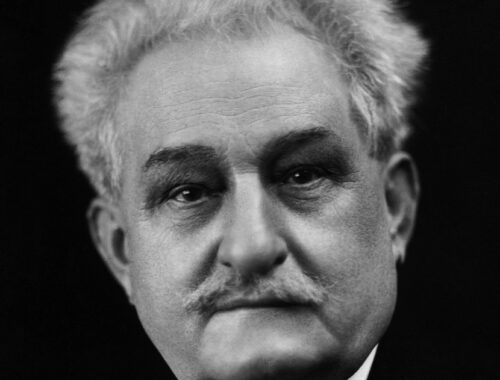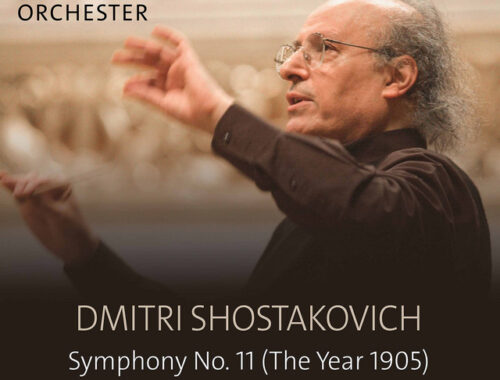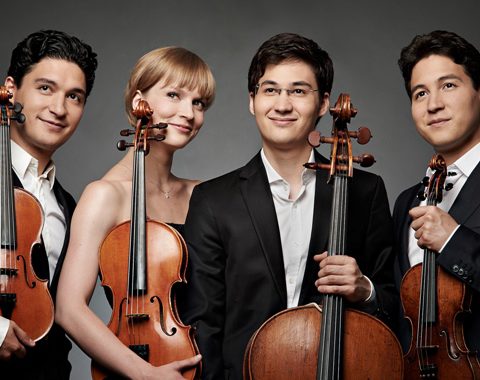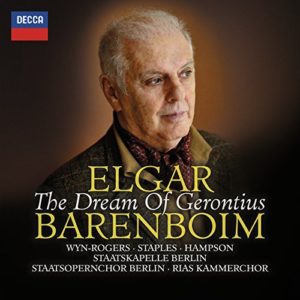GRAMOPHONE Review: Elgar The Dream of Gerontius – Soloists, Staatskapelle Berlin/Barenboim
There is probably no such thing as the perfect Gerontius. Every recording is flawed in some way. Even the classic (and glorious) Barbirolli has Kim Borg’s misshapen vowels to contend with. But the inspirational nature of the piece relies so much on temperament to carry it into the ascendency that perfection is probably not such a good thing anyway.
Casting, of course, is crucial and I happen to know that this latest Barenboim offering went through some trials and tribulations in that regard. But the discs in front of me are the ones I am reviewing and they throw up much that is exciting and moving and, yes, even surprising. Barenboim certainly honours the piece – no question about that – and whilst there are choices I would have made differently, the grand rhetoric and quiet mysticism of the piece are generally not found wanting. It carries, as you might expect, huge authority. Even the strange sepulchral colours of the opening page brings a tangible murmur of reassurance from the luminous Staatskapelle Berlin strings and as the Prelude rolls out with deep and abiding sureness, key themes previewed with an already powerful sense of deja vu, Barenboim’s instinctive feeling for Elgar’s phraseology establishes a thoroughly “authentic” manner.
Andrew Staples is a young sounding and affecting Gerontius, occasionally perhaps a little overly reverent in his response to text (an English chorister’s background) but he uses his vulnerability to good effect – “Mary, pray for me” – and though the heroics can be a bit of a stretch, that can also be exciting conveying in itself the sense of a human soul in extremis: the climax of Sanctus fortis (beautiful singing throughout this section) “In Thine own agony” (though nothing can erase memories of Pears in this moment) is one such instance and, of course, “Take me away”. It’s a more than creditable account of a role where the delicate balance between purity and heft is never easy to find in one voice.
Catherine Wyn-Rogers is, of course, a very experienced pair of hands having grown to inhabit the role of the Angel over many years. She sings with great feeling and intensity and an always vivid response to text. Though some may find the beat in the voice obtrusive (I don’t) the depth of her characterisation is a far cry from her somewhat cautious showing with Vernon Handley nearly a quarter of a century ago and through many a beauteously soft phrase and conversely some chilling chest tones as we draw nearer the Judgement Hall she really brings the role off the page.
Thomas Hampson is hugely authoritative in his priestly exhortations to “Go forth!” – listen to how he intensifies dramatic effect through the colour of the words – and the harmonic frisson between him and the soaring sopranos in the final reprise is glorious.
Barenboim’s Berlin choirs are both sensitive and impressive and refreshingly true in intonation – though a little hampered in the Demon’s Chorus by Barenboim’s heavy pacing which initially lacks the snap and snarl to give the panting hoards their vindictiveness. I also wish the full-throated arrival of “Praise to the holiest” were marked with a more emphatic and euphoric and, more importantly, longer landing on the first word. That said, the chorus gathers momentum swinging to its climax with the wind under collective wings and the big pay-of – a huge ritardando and mighty sostenuto on the final chord – is pretty hair-raising.
So plenty to savour in this Gerontius – a fine companion to Barenboim’s marvellous accounts of the two symphonies – and if not the Gerontius to have (Barbirolli must retain that honour) I know I shall be returning to it often and with great pleasure.
You May Also Like

GRAMOPHONE: From Where I Sit – Awards 2020 Issue
11/11/2020
GRAMOPHONE Review: Shostakovich Symphony No.11 ‘The Year 1905’ – SWR Symphony Orchestra/Inbal
18/06/2021
